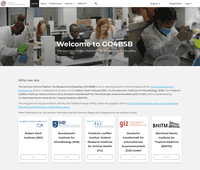German Online Platform for Biosecurity and Biosafety
[GO4BSB]
GO4BSB is an e-learning platform created by the partner institutes of the German Biosecurity Programme to support their education and capacity strengthening initiatives.
SUMMARY
German Online Platform for Biosecurity and Biosafety (GO4BSB) is an e-learning platform created by the partner institutes of the German Biosecurity Programme to support their education and capacity strengthening initiatives. GO4BSB was launched in 2017 and now has users from more than 40 countries. It aims to contribute to raising awareness and minimizing risks associated with highly pathogenic agents and enables scientific exchange. The platform is a collaborative initiative of the Robert Koch Institute (RKI), the Bundeswehr Institute for Microbiology (IMB), the Friedrich-Loeffler-Institute, Island of Riems (FLI), Deutsche Gesellschaft für Internationale Zusammenarbeit (GIZ), and is hosted and coordinated by the Bernhard Nocht Institute for Tropical Medicine (BNITM). The platform also launched a GO4BSB COVID-19 Digital Initiative during the pandemic to support scientific exchange and awareness among members. The platform is available in English, French, German, and Russian.
The German Biosecurity Programme (GBP) was launched in 2013 by the German Federal Foreign Office in order to implement sustainable biosafety and biosecurity projects in various countries under the auspices of the G7 Global Partnership against the Spread of Weapons and Materials of Mass Destruction, and to strengthen the Biological Weapons Convention (BWC). The GBP is currently active in nine countries as well as with two supraregional projects, with projects focusing on reducing biological threats and strengthening the health capacities of partner countries in Africa, Central Asia and Eastern Europe, thus enhancing their national security. Their projects tackle six main areas: 1. awareness raising, 2. biosafety and biosecurity, 3. surveillance, 4. detection and diagnostics, 5. networking, and 6. capacity development.


..png)
